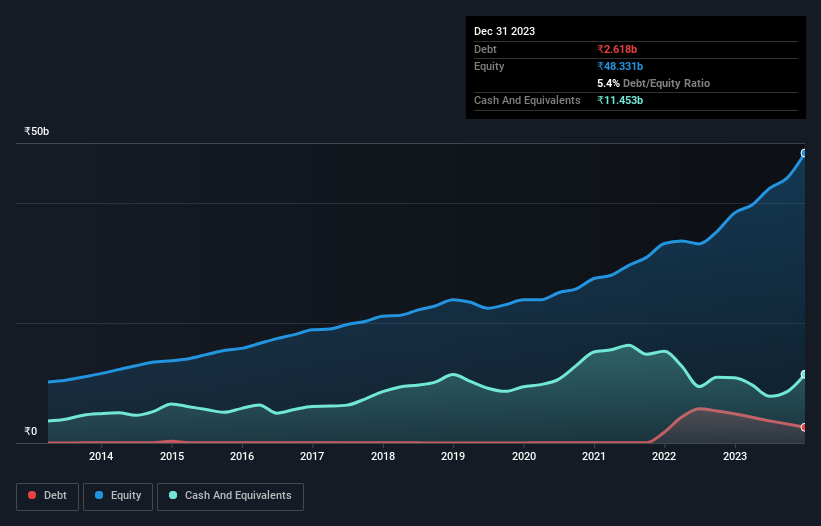
Some say volatility, rather than debt, is the best way to think about risk as an investor, but Warren Buffett famously said that 'Volatility is far from synonymous with risk.' When we think about how risky a company is, we always like to look at its use of debt, since debt overload can lead to ruin. We note that Persistent Systems Limited (NSE:PERSISTENT) does have debt on its balance sheet. But the more important question is: how much risk is that debt creating?
When Is Debt Dangerous?
Debt assists a business until the business has trouble paying it off, either with new capital or with free cash flow. Ultimately, if the company can't fulfill its legal obligations to repay debt, shareholders could walk away with nothing. While that is not too common, we often do see indebted companies permanently diluting shareholders because lenders force them to raise capital at a distressed price. Having said that, the most common situation is where a company manages its debt reasonably well - and to its own advantage. When we examine debt levels, we first consider both cash and debt levels, together.
Check out our latest analysis for Persistent Systems
What Is Persistent Systems's Net Debt?
As you can see below, Persistent Systems had ₹2.62b of debt at December 2023, down from ₹4.88b a year prior. However, it does have ₹11.5b in cash offsetting this, leading to net cash of ₹8.84b.

How Strong Is Persistent Systems' Balance Sheet?
According to the last reported balance sheet, Persistent Systems had liabilities of ₹21.1b due within 12 months, and liabilities of ₹2.74b due beyond 12 months. On the other hand, it had cash of ₹11.5b and ₹23.0b worth of receivables due within a year. So it can boast ₹10.7b more liquid assets than total liabilities.
This state of affairs indicates that Persistent Systems' balance sheet looks quite solid, as its total liabilities are just about equal to its liquid assets. So while it's hard to imagine that the ₹634.5b company is struggling for cash, we still think it's worth monitoring its balance sheet. Succinctly put, Persistent Systems boasts net cash, so it's fair to say it does not have a heavy debt load!
Also good is that Persistent Systems grew its EBIT at 19% over the last year, further increasing its ability to manage debt. There's no doubt that we learn most about debt from the balance sheet. But it is future earnings, more than anything, that will determine Persistent Systems's ability to maintain a healthy balance sheet going forward. So if you want to see what the professionals think, you might find this free report on analyst profit forecasts to be interesting.
Finally, a company can only pay off debt with cold hard cash, not accounting profits. Persistent Systems may have net cash on the balance sheet, but it is still interesting to look at how well the business converts its earnings before interest and tax (EBIT) to free cash flow, because that will influence both its need for, and its capacity to manage debt. Over the most recent three years, Persistent Systems recorded free cash flow worth 57% of its EBIT, which is around normal, given free cash flow excludes interest and tax. This free cash flow puts the company in a good position to pay down debt, when appropriate.
Summing Up
While we empathize with investors who find debt concerning, you should keep in mind that Persistent Systems has net cash of ₹8.84b, as well as more liquid assets than liabilities. And it impressed us with its EBIT growth of 19% over the last year. So we don't think Persistent Systems's use of debt is risky. Over time, share prices tend to follow earnings per share, so if you're interested in Persistent Systems, you may well want to click here to check an interactive graph of its earnings per share history.
At the end of the day, it's often better to focus on companies that are free from net debt. You can access our special list of such companies (all with a track record of profit growth). It's free.
New: Manage All Your Stock Portfolios in One Place
We've created the ultimate portfolio companion for stock investors, and it's free.
• Connect an unlimited number of Portfolios and see your total in one currency
• Be alerted to new Warning Signs or Risks via email or mobile
• Track the Fair Value of your stocks
Have feedback on this article? Concerned about the content? Get in touch with us directly. Alternatively, email editorial-team (at) simplywallst.com.
This article by Simply Wall St is general in nature. We provide commentary based on historical data and analyst forecasts only using an unbiased methodology and our articles are not intended to be financial advice. It does not constitute a recommendation to buy or sell any stock, and does not take account of your objectives, or your financial situation. We aim to bring you long-term focused analysis driven by fundamental data. Note that our analysis may not factor in the latest price-sensitive company announcements or qualitative material. Simply Wall St has no position in any stocks mentioned.
About NSEI:PERSISTENT
Persistent Systems
Provides software products, services, and technology solutions in India, North America, and internationally.
High growth potential with solid track record and pays a dividend.


